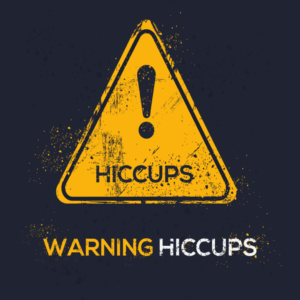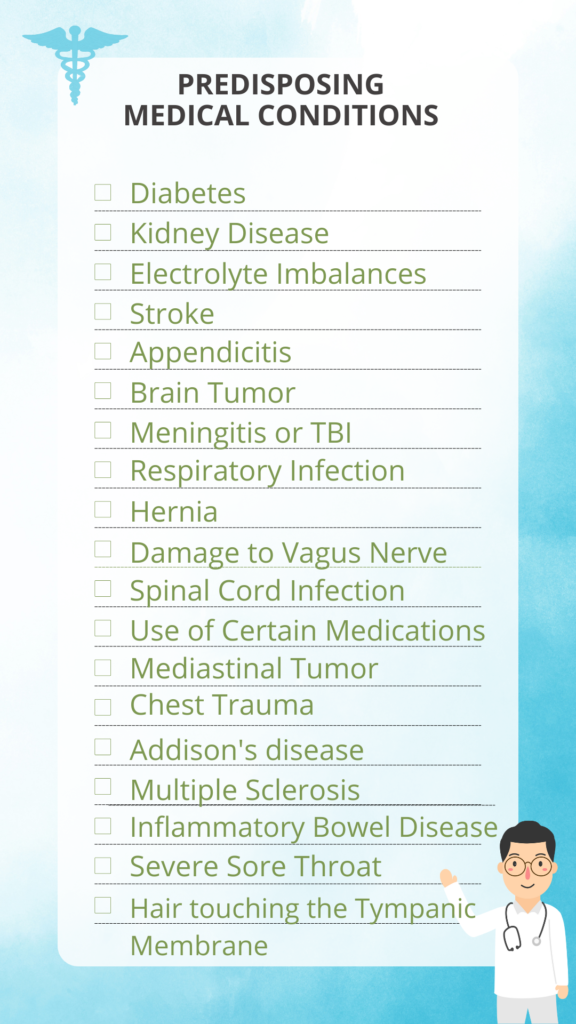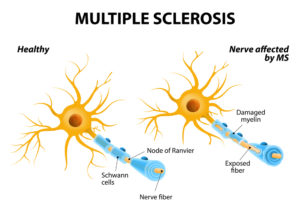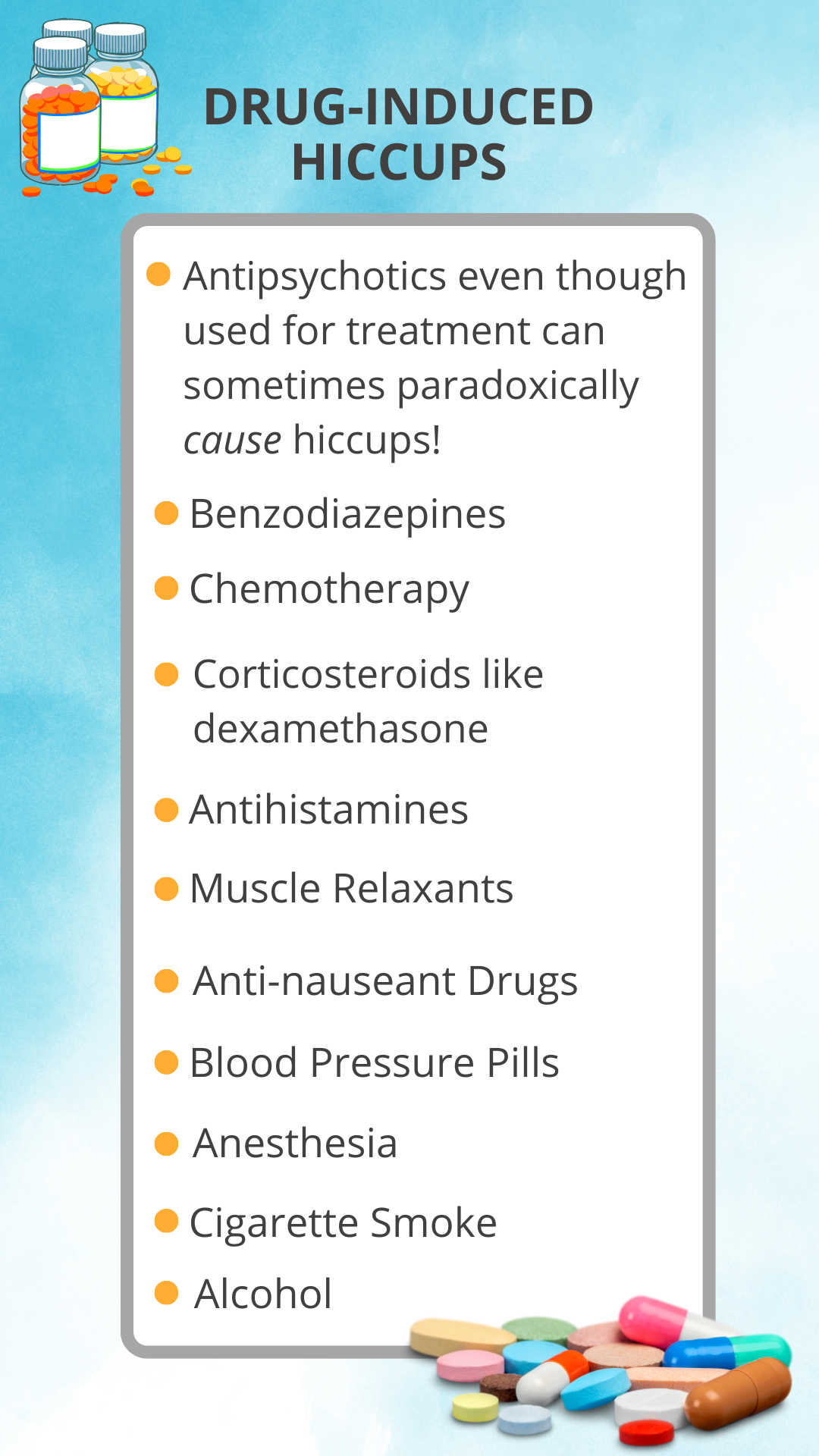What's On This Page?
ToggleFor most of you, hiccups arise for a short time frame, usually a few minutes, and they resolve on their own. The most common causes include overeating, consuming alcohol, or swallowing too much air. Of course, there are other reasons which you can see outlined below.
But what if the cause of your hiccups isn’t apparent? What if you suddenly wake up at 1 am with intractable hiccups? And heaven forbid, what if they last for days? It’s true that some people have severe, intractable hiccups that last for months, and even years! When the cause is undeterminable, the physicians term it “idiopathic” and then they just look for ways to help you. The medical term for intractable hiccups is “singultus.”
But today, I’d like to offer insight into WHY a person has chronic hiccups, and that way, a better treatment can be crafted for you. Treating idiopathic intractable cases is very hard, and usually not effective. It’s important to find a cause. Having hiccups for a long time will cause malnourishment, dehydration, mental stress, chest pain, abdominal discomfort, and problems in your relationship. Not to mention you can’t speak properly anymore!
Today’s blog will lend an explanation for how to get rid of them! Again, it’s very hard and usually impossible to effectively treat serious cases of hiccups without knowing the cause.
Why Do Humans Hiccup Anyway?
The fact that we hiccup is interesting in and of itself. Why would this even occur? After all, it’s an involuntary thing and occurs when the diaphragm contracts. This means your diaphragm pulls down a little bit and draws some air in between 2 breaths. Immediately thereafter, your windpipe closes for a split second to prevent more air from entering the lungs. The process isn’t entirely understood, but we know that your spinal cord is involved. And that is an important piece of information for people with intractable hiccups.
Common Causes of Short-term Hiccups
- Drinking alcohol
- Eating too much – may cause a gastric sneezing reflex called SNATIATION!
- Eating too fast!
- Eating heavily spiced food
- Drinking carbonated water or soda
- Going from hot to cold air
- Swallowing air termed “aerophagia” while drinking, eating, or chewing gum
- Getting overly excited or stressed out

The First 2 Things to Do if Hiccups Don’t Stop
1. The first thing you should do is tell your doctor. You don’t want to live with this, do you?
Relay to your practitioner that you’ve developed the hiccup condition and it has been going on for however long! And make an appointment so you can be properly evaluated at the clinic.
2. Next, you should write down all of your current medications, as well as those that you have taken in the past week. Don’t forget anything. For example, you may only take two pills a day for a specific condition, but you might forget that the week prior you had a procedure like a sciatic nerve block where they injected things into your back. As another example, you may forget that you were given some anesthesia the week prior for a routine colonoscopy. Try to remember your exposure to ALL medications and treatments in the prior 7 days.
Write down everything, no matter how irrelevant you think it is. The reason this list of medications is important is that certain ones cause intractable hiccups! You may have exposed yourself to a drug that is inducing the problem. Resolution of hiccups will occur if and when you know the cause of it. See below for my List of Medications that cause Drug-Induced Hiccups.
The Etiology of Persistent Hiccups is Not Always Clear
So now we know the frequent causes for regular, short-term hiccups. We also know that they resolve on their own. Now, I will outline some of the more bizarre causes last a long time. Even though it is rare to see this, for those people who have it, or have experienced a week’s worth of hiccuping (!) this blog is very important, if not life-changing. So for that reason, let’s go over the lesser known, but possible reasons for your discomfort.
9 Bizarre Causes for Intractable Hiccups
1. Steroid use – Medications given orally (or by injection) that belong to the corticosteroid category can trigger long-lasting hiccups. They are not life-threatening of course, but uncomfortable and alarming just the same! A moment ago, I asked you to write down a list of your medications and mentioned to include treatments as well (ie a lumbar shot or nerve block for sciatica). That’s because steroids are sometimes included in the injection.
While very rare, it is still an unusual cause of intractable hiccups and you should know about it if you have to get routine nerve blocks. Of the steroids, it appears that dexamethasone is the worst offender. Here’s a CASE STUDY of someone given intravenous dexamethasone.
2. Pregnancy – All mothers-to-be experience hiccups, that’s a normal and natural occurrence and nothing to worry about. These episodes do not hurt you or your baby. Short-term hiccups during pregnancy are almost always tied to easily treatable conditions. For example, GERD (gastroesophageal reflux disease), an episode of asthma, a bad reaction to food or medicine, or something else that can be addressed without the use of heavy-duty medications like antipsychotics. But if you are pregnant, and the condition lasts more than an hour, you will need to contact your obstetrician for advice. There are medical conditions that can predispose a person to persistent hiccups. I’ve made a graphic for you to list those conditions.

3. Thyroid Nodules or Goiters – You may not even realize you have a thyroid problem, because tests are not always conclusive. And with hiccups, doctors don’t automatically look at your thyroid, it is simply that unusual! So I’m listing this because thyroid illness can cause frequent or persistent hiccups and now you know to check this out with an endocrinologist and a good ultrasound. Here’s an interesting CASE STUDY that you can read to learn more about a person whose hiccups resolved after PTU medication treatment for their hyperthyroidism.
4. Pericarditis – This is inflammation of the heart tissue which can cause not only persistent hiccups but many other symptoms that you would not associate with the heart. For example, pericarditis can cause weakness, fatigue, heart palpitations, shortness of breath when lying down, or swelling of the legs. There may also be a mild cough or a low-grade fever.
However, hiccups are not something typically associated with pericarditis so I am letting you know that it may be part of the picture. Now that you know, if you have a few of those symptoms I’ve just shared with you, you can see your cardiologist right away.
5. Low sodium or Low Calcium – While unusual, electrolyte disturbances are another bizarre cause of intractable hiccups. This PAPER discusses low sodium as one potential cause. Hypocalcemia (low calcium) and hypokalemia (low potassium) are two other frequently overlooked causes.
6. Schwannoma Growth – This is a rare, and bizarre possibility, and has to do with Schwann cells which are the cells that protect your nerves and make myelin which coats the cells and keeps you from developing neuropathy. I have another article about neuropathy in case that topic interests you.

There was a CASE of a man who had intractable hiccups for 20 years due to this condition! How utterly frustrating. No one could help him for years, he underwent multiple “standard of care” procedures to no avail. Then one day, a brilliant physician found the problem which was a Schwannoma that had grown to 4.8 cm and had impacted his phrenic nerve for years! Upon surgical removal, the hiccups abated.
7. Surgery – There are several reasons, however, intubation of a person can stimulate the glottis and result in persistent hiccups.
8. Shingles – At times, people have been known to have a prodromal warning of the onset of herpes zoster which causes shingles. Read THIS and also THIS PAPER.
9. Respiratory infections – While extraordinarily rare, there is the possibility that persistent hiccups may be associated with COVID. If you are interested in this specific trigger, read this PAPER or this PAPER. Some complications associated with respiratory infections may also cause hiccups. These include pleurisy in the chest, as well as pneumonia.
Management of Intractable Hiccups
For regular hiccups, most people hold their breath for a few seconds. That’s the most common trick. Others know you can drink some water and it will help remedy the problem. The medical term for this simplistic intervention is nasopharyngeal stimulation!
Some people will do all sorts of things to make the hiccups stop, like cross their eyes, hold their breath, and drink something! When uncomfortable and desperate you’ll do anything!
Holding your breath for a few seconds, or coughing may clear the problem. Those are respiratory maneuvers. Some of you know you can put a compress to your face, breath into a paper bag, or induce a mild gag reflex! Those are methods of vagal stimulation.
These are all effective short-term fixes!

The goal is to interrupt the repetitive diaphragmatic contraction. None of those tricks work for persistent hiccups though. Other strategies have been tried for persistent cases, people will try anything and everything! However none of the following really work, although they might make you feel good for a minute and then you forget you have hiccups!
People have tried the following to stop hiccups. If you can believe this, having sex might work to stop hiccups! And if it doesn’t, so what? 🤣
NON-conventional Methods of Stopping Hiccups Include:
- Marijuana use
- Hypnosis
- Sexual stimulation or orgasm
- Acupuncture
- Eating ice cream

Medications for the Treatment of Hiccups
In the old days, doctors would prescribe chlorpromazine, but the side effects were virtually intolerable. Nowadays, risperidone (Risperdal®) is probably the drug of choice for a bad case of intractable hiccups. I’d say the side effects are still pretty harsh, but nothing like those associated with chlorpromazine. This medication acts upon the dopaminergic and the serotonergic system of the body. Because it acts upon both of these pathways, risperidone is also used for serious bouts of depression, schizophrenia, bipolar disorder, and sometimes autism.
Atypical Antipsychotics Are Used for Intractable Hiccups
Recent scientific papers point to two different pathways in the human body that trigger involuntary hiccups. These include both the dopaminergic and serotonergic pathways. These are both incredibly complex pathways and if you have a minute’s worth of understanding about them, you’ll know that they also have bearing on your physical movement, digestion, muscle control, mood, pain control, sexual arousal, ability to cough, vomit or swallow, and your reflexes!
Messing with those pathways for a long time can impact all of those bodily functions. This warning is to tell you that if you take a standard prescribed medication that impacts either the dopaminergic pathway or the serotonergic pathway (and there are many), side effects may be widespread and serious. Just keep this in your back pocket.
Anticonvulsants Are Also Used for Intractable Hiccups
Another category of medications includes anticonvulsant drugs such as gabapentin, carbamazepine, valproate or phenytoin. Just FYI, there are other newer agents related to those drugs that I have not listed here.
These medications work centrally in the body, similar to antipsychotics. In other words, they are not working on your diaphragm, they are working in your brain and spinal cord area, and they are impacting various neurotransmitters. Anticonvulsant medications are very effective in people with a spinal cord lesion or some other central nervous system disorder.
Miscellaneous Medications
For persistent hiccups, consider the following medications for a trial run. These medications require a prescription but they may work for you:
- Baclofen
- Metoclopramide
- Amantadine
- Amitriptyline
Summary About Hiccups
A hiccup happens because of the involuntary, spasmodic contraction of your diaphragm and intercostal muscles. In some ways, it’s really a disruption of the swallowing reflex. This causes a cycle to occur of sudden inspiration of air, that ends with the closure of the glottis and then you hear the “hic” sound. You may get 5 or 10 a minute, or it might be faster like 50 to 60 hiccups per minute! It almost always goes away on its own and everybody gets hiccups! But if they don’t go away, it could be due to a serious drug reaction, or medical condition and therefore you need to seek proper medical attention.
If you’re not sure what the “glottis” is, it’s the part of your voice box that includes vocal cords and the opening between them. It’s how you speak, whisper, or sing. When the stunning and incredibly talented singer, Shania Twain lost her voice for years, it was her voice box that got impacted! She did not have intractable hiccups, but she did have Lyme disease. I’ve written a lot about that topic, HERE is just one article. Thankfully Shania regained her beautiful voice after surgery!
Anyway, if you have hiccups and they don’t go away, seek treatment because the sooner you intervene, the easier it is to manage. If you’ve enjoyed this article or learned something, please forward it to a friend.

Suzy Cohen, has been a licensed pharmacist for over 30 years and believes the best approach to chronic illness is a combination of natural medicine and conventional. She founded her own dietary supplement company specializing in custom-formulas, some of which have patents. With a special focus on functional medicine, thyroid health and drug nutrient depletion, Suzy is the author of several related books including Thyroid Healthy, Drug Muggers, Diabetes Without Drugs, and a nationally syndicated column.


